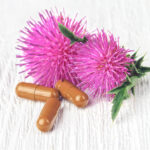“Tune up” a clogged liver with a natural compound
 (NaturalHealth365) The liver weighs about three pounds – a small fraction of the average adult’s body weight. This remarkable organ plays an outsize role in sustaining life and health – with a daily “to-do” list that includes cleansing the blood of toxins and bacteria, producing nutrients, creating bile, and regulating blood sugar. Unfortunately, exposure to toxins and environmental pollutants can overburden the liver, leading to sluggish and inefficient liver function. This is where the humble milk thistle can come to the rescue.
(NaturalHealth365) The liver weighs about three pounds – a small fraction of the average adult’s body weight. This remarkable organ plays an outsize role in sustaining life and health – with a daily “to-do” list that includes cleansing the blood of toxins and bacteria, producing nutrients, creating bile, and regulating blood sugar. Unfortunately, exposure to toxins and environmental pollutants can overburden the liver, leading to sluggish and inefficient liver function. This is where the humble milk thistle can come to the rescue.
A review in Food Science and Nutrition reports that milk thistle’s major bioactive compound – a flavonoid known as silymarin – supports liver function on multiple levels. You won’t want to overlook this versatile herb’s potential to renew and reinvigorate your liver health.
Silymarin in milk thistle has “remarkable” liver-protective qualities
In the comprehensive narrative review, the authors looked at decades of cell, animal, and human studies on silymarin. After examining the substantiating studies, the authors credited silymarin with the potential to improve liver function, protect against environmental poisons (such as pesticides and heavy metals) – and even help to regenerate liver cells.
In addition, silymarin’s ability to modulate levels of cytokines facilitates anti-inflammatory effects.
The review authors reported that clinical trials with silymarin have shown improvements in liver enzyme levels such as ALT (alanine transaminase) and AST (aspartate aminotransferase). Finally, silymarin has been shown to ramp up glutathione levels, the body’s top antioxidant and detoxifier. The impressed researchers lauded silymarin as a “promising natural compound with multifaceted liver-protective properties and therapeutic potential.”
Natural healers have long recognized the potential of milk thistle
Milk thistle, which is generally recognized as the “gold standard” for herbal liver support, has a long, illustrious history in natural healing. Its ancient legacy can be traced back to the first-century Greek physician Dioscorides, who reportedly utilized it to treat snakebite.
Recognizing milk thistle’s protective properties, other natural healers used it to help neutralize amatoxin, the lethal ingredient in the “death cap” mushroom. Natural healers relied on the herb for centuries to address jaundice and gallstones. It wasn’t until 1968 that researchers identified silymarin as milk thistle’s “secret weapon” and found that it could help protect against liver damage by preventing harmful substances from entering liver cells.
Milk thistle’s silymarin bestows antioxidant and metabolic gifts
Researchers also discovered that silymarin was a powerful antioxidant that could neutralize harmful free radicals that cause oxidative stress while depleting the body’s stores of precious natural antioxidants such as glutathione and superoxide dismutase. Silymarin can help your liver “fight back” against falling glutathione levels by making more cysteine – a glutathione building block – available for biosynthesis.
Incidentally, by improving lipolysis (fat-burning), milk thistle extract can help suppress fat accumulation in the liver – and may even help trim belly fat. The authors cited a 2021 study showing that 90 days of supplementation with 420 mg of silymarin daily decreased participants’ abdominal circumference and body mass index.
Here is how you can support an overworked liver
Could you be a candidate for milk thistle? Telltale signs that your liver is not “firing on all cylinders” include poor digestion, hormonal and blood sugar imbalances, rashes, weight gain, fatigue, and upper abdominal pain. Food cravings and food sensitivities can also be a tip-off to a congested liver.
Milk thistle extract is available as a supplement in powders, capsules, and soft gels. Look for a formulation standardized to 70 to 80 percent silymarin, with the plant’s botanical name, Silybum marianum, on the label. When possible, opt for a phospholipid formulation, which is believed to be the most easily absorbed.
The authors of the new review hailed milk thistle’s outstanding safety profile and noted that side effects – usually limited to gastrointestinal upsets – are uncommon and generally mild. However, you shouldn’t take milk thistle if you are allergic to any members of the aster family, such as sunflowers, daisies, or chamomile.
Holistic healthcare providers typically recommend 420 mg of milk thistle extract a day. But check first with your doctor to see if milk thistle is helpful to you.
For centuries, milk thistle has been the “go-to” herb for liver complaints, and the new review confirms the scientific basis for its efficacy. Milk thistle might be for you if you’re looking for a natural intervention to help coax a sluggish liver towards more efficient function and better overall health and well-being.
Editor’s note: The NaturalHealth365 Store offers a high quality liver support formula called, LiverLuv by LuvByNature. Click here to learn more and order today.
Sources for this article include:
NIH.gov
NIH.gov
Springer.com
Healthline.com
Functionaldiagnosticnutrition.com
Hopkinsmedicine.org



